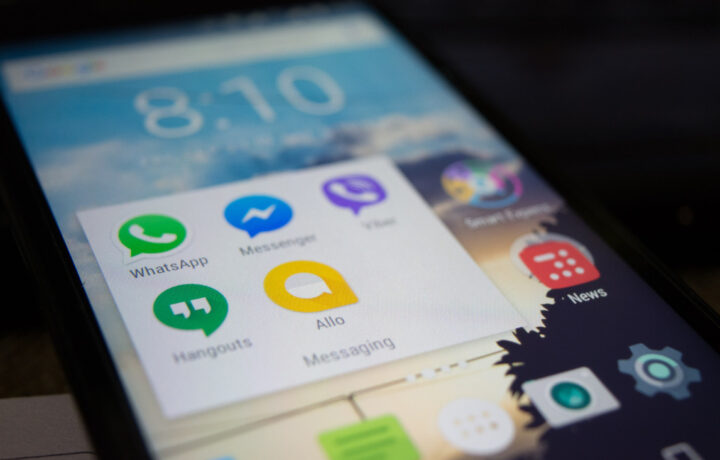It’s no secret that the government’s security policies haven’t kept up with changes in technology. That void in guidance generates many recurring questions within the cleared community, including whether clearance holders can use foreign messaging apps.
This is likely to be a non-issue for most natural-born clearance holders, except for those trying to hide communications from U.S. law enforcement agencies. But I’ve found it to be a matter of intense interest to the many naturalized U.S. citizen clearance holders who maintain familial connections or other relationships in their country of origin. The usual reasons cited to me for using foreign messaging apps all seem perfectly legitimate: familiarity, cost-savings, and accessibility in foreign markets. Nonetheless, questions linger for many clearance holders about both legalities and optics.
Are Foreign Messaging Apps Legal?
Let’s start with the legal aspect: there is currently no law that precludes U.S. citizens (including clearance-holders) from using a foreign messaging app. There is also currently no government-wide policy that prohibits clearance-holders from using foreign messaging apps.
That being said, it is possible there may be an agency-specific policy on the matter of which I’m unaware quietly lurking somewhere, perhaps in the intelligence community. Clearance holders should verify the absence of any agency-specific policy with security officials in writing before downloading or using a foreign messaging app.
Wisdom Over Laws
Next, the optics aspect. Just because there is no specific law or policy prohibiting conduct doesn’t mean it is a wise idea. The National Adjudicative Guidelines for Security Clearances are broadly written and give security officials enormous discretion in assessing things like perceived vulnerability to foreign influence. If you’re trying to minimize your ties to foreign relatives or contacts and maximize your ties in the U.S. – the general formula for mitigating foreign influence concerns – guess what doesn’t help? Downloading and using a foreign messaging app solely to communicate with foreign nationals! Nothing says “bonds of affection” quite like a dedicated app for maintaining the relationships.
Practically-speaking, it is unlikely that using a foreign messaging app to communicate with friends or relatives in, say, Mexico is going to be viewed as a major security risk unless the contacts are foreign government officials or involved in criminal activity (in which case the means of communication is of secondary concern). But maintaining one to communicate with friends and relatives in China or Russia may be a different story.
Unfortunately, the identity of the country does play a significant role in how the government assesses the potential for foreign influence. This isn’t necessarily meant to call into question the clearance-holder’s patriotism (although I understand why it can feel that way). Rather, it is because there is a heightened risk of the foreign relatives or friends being used by a hostile government against the clearance-holder as leverage. Even the most patriotic individual may succumb to pressure if a foreign government is putting the squeeze on loved ones. The same is true for relationships maintained via other means of communication, but there is something about app communication that often implies closer bonds and, therefore, arguably heightened vulnerability.
Security Concerns
Finally, it is worth considering other practical security concerns raised by foreign messaging app usage (i.e., what else could go wrong). Case-in-point: TikTok.
The national security risks posed by that application are well-documented and resulted in the Trump Administration banning TikTok in the United States before the ban was subsequently reversed without explanation by the Biden Administration. If TikTok poses a national security risk because the Chinese government has access to U.S. user data and communications, imagine the intelligence bonanza for hostile foreign governments created by access to private communications between family members or friends. Users could, quite literally, be providing a foreign government with a road-map for exploiting their unique personal vulnerabilities.
But wait, some of you may be thinking: can’t a foreign government similarly monitor email and telephone communications to/from their territory? Yes, in many cases, they can – so the reality is that foreign messaging apps are often indistinguishable in terms of their in-app privacy. In my experience, however, communication apps tend to create a false sense of privacy between users. Most savvy individuals calling or emailing someone in a hostile foreign country probably assume that their communications are subject to monitoring and exercise considerable caution. They’re less likely to share problematic information or engage in other risky behaviors like sending compromising videos or images. On the other hand, there is something about the instant-ness of communicating by app that seems to lower inhibitions and causes people to share without first considering the potential ramifications. We’ve all sent emails we wish we could un-send, but how many more times have you wished you could claw-back a text or app message?
Of course, all of this doesn’t even begin to address the risk cited by banning TikTok: the extent to which the app owner can access other user data like geolocation, other apps, contacts, and keystrokes. Even a cautious foreign app user may be giving up far more privacy than he or she bargained for. That may be the biggest risk of all.
Reward and Risk
Despite these concerns, some clearance holders may still decide that the reward of using foreign messaging apps outweighs the risks. That is an individual choice in the absence of official prohibition – as long as users understand that they are assuming a variety of risks, including some that are avoidable, for both themselves and their loved ones.
This article is intended as general information only and should not be construed as legal advice. Although the information is believed to be accurate as of the publication date, no guarantee or warranty is offered or implied. Laws and government policies are subject to change, and the information provided herein may not provide a complete or current analysis of the topic or other pertinent considerations. Consult an attorney regarding your specific situation.




